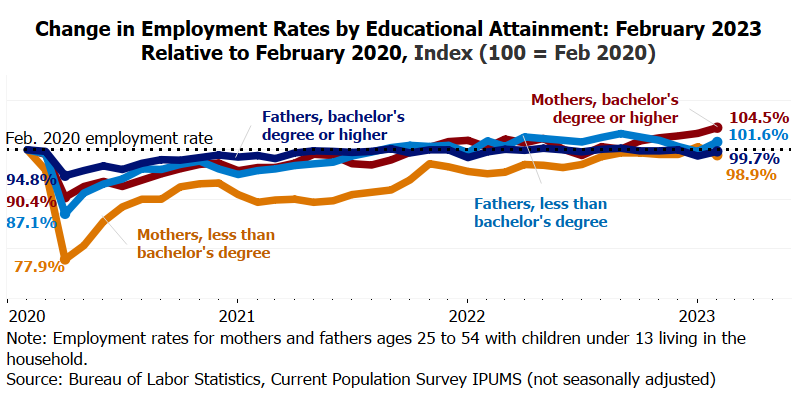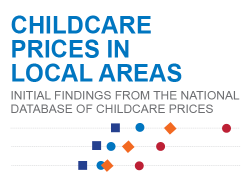The pandemic hit working moms hard. Following a significant decline in employment in the early months of the COVID-19 pandemic and a lagging recovery in 2021 compared with fathers, maternal employment finally returned to pre-pandemic levels in late 2022. But this employment recovery has not reached all groups of mothers. One of the groups that experienced the largest employment losses during the pandemic was mothers without a bachelor’s degree, and they have not yet recovered to their pre-pandemic employment levels. A new report tracks maternal employment trends during the pandemic, showing which groups have yet to recover.
At the onset of the pandemic, employment losses were steep, especially for lower-educated workers. Yet, even in the first few months of the pandemic, mothers without a bachelor’s degree had reductions in employment rates that were substantially larger than the reductions fathers experienced. In April 2020, mothers without a bachelor’s degree had an employment rate that was 22.1% below their February 2020 rate. The employment rate for similarly educated fathers fell by 12.9% in the same timeframe.

Then, as the pandemic progressed, it was specifically mothers, and not fathers, with lower educational attainment that were left behind in the recovery. The gap in recovery between mothers with lower educational attainment and other parents was particularly large throughout 2020 into the first half of 2022. Fathers with lower educational attainment exceeded pre-pandemic employment levels by September 2021 and remain 1.6% above pre-pandemic levels while mothers with lower educational attainment remained 1.1% below pre-pandemic levels in February 2023.
One reason for this lagging recovery is women’s unequal representation in specific industries. Women were more likely to work in industries that experienced large reductions in employment early in the pandemic compared with men, contributing to the steep employment losses among mothers with lower educational attainment. In addition, mothers were more likely to leave their jobs to take on added caregiving and educational responsibilities as childcare centers and schools closed to the public during the pandemic, leaving many without viable caregiving arrangements. New research shows that these gaps in care infrastructure were linked to slow employment recovery among mothers without a bachelor’s degree. Childcare-related employment disruptions remain elevated relative to pre-pandemic levels, and childcare prices continue to edge up, which is linked to lower maternal employment, especially among mothers with less education.
Women with less formal education are more likely to be in low-wage jobs with fewer workplace benefits, and paying for child care requires a larger portion of their paychecks. Combined with other factors, this leads to a greater likelihood of leaving the labor force or reducing work hours when providing family care. A recent report commissioned by the Women’s Bureau quantifies how gaps in employment for caregiving contribute to lower lifetime earnings among mothers, finding that on average mothers with lower educational attainment lose 13-26% of total lifetime earnings due to family caregiving. Even when employment rates recover among mothers without a bachelor’s degree, they may face diminished job prospects and reduced lifetime earnings associated with pandemic-related job interruptions.
A recently signed Executive Order on Increasing Access to High-Quality Care and Supporting Caregivers includes more than 50 directives to Federal agencies to expand efforts to improve compensation and job quality for caregivers and increase access to affordable care for families. Expanded access to paid leave, employee-driven flexibility, and fair scheduling, along with improved compensation and greater investment in care infrastructure can help achieve a more equitable recovery. For more information on maternal employment during the pandemic, check out our new report.
Christin Landivar is a senior researcher in the Women’s Bureau. Follow the bureau on Twitter @WB_DOL.

 U.S. Department of Labor Blog
U.S. Department of Labor Blog


